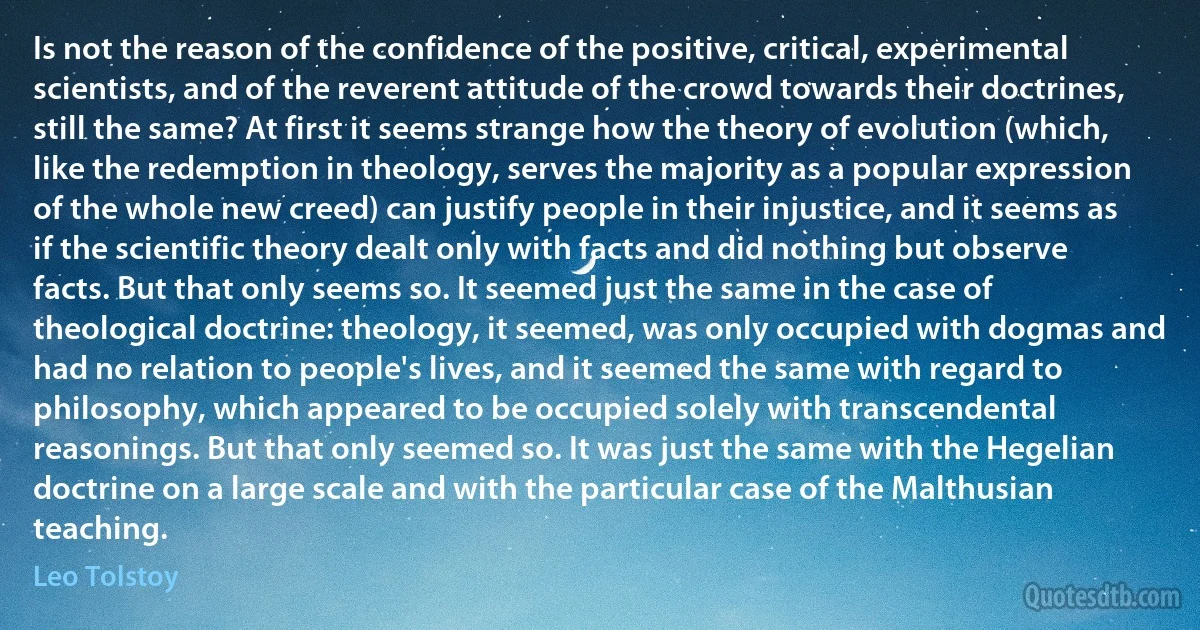
Is not the reason of the confidence of the positive, critical, experimental scientists, and of the reverent attitude of the crowd towards their doctrines, still the same? At first it seems strange how the theory of evolution (which, like the redemption in theology, serves the majority as a popular expression of the whole new creed) can justify people in their injustice, and it seems as if the scientific theory dealt only with facts and did nothing but observe facts. But that only seems so. It seemed just the same in the case of theological doctrine: theology, it seemed, was only occupied with dogmas and had no relation to people's lives, and it seemed the same with regard to philosophy, which appeared to be occupied solely with transcendental reasonings. But that only seemed so. It was just the same with the Hegelian doctrine on a large scale and with the particular case of the Malthusian teaching.
Leo TolstoyRelated topics
case confidence creed crowd deal doctrine evolution experimental hegelian large lives nothing observe people reason strange teaching theology transcendental redemption factsRelated quotes
An atheist, like a Christian, holds that we can know whether or not there is a God. The Christian holds that we can know there is a God; the atheist, that we can know there is not. The Agnostic suspends judgment, saying that there are not sufficient grounds either for affirmation or for denial. At the same time, an Agnostic may hold that the existence of God, though not impossible, is very improbable; he may even hold it so improbable that it is not worth considering in practice. In that case, he is not far removed from atheism. His attitude may be that which a careful philosopher would have towards the gods of ancient Greece. If I were asked to prove that Zeus and Poseidon and Hera and the rest of the Olympians do not exist, I should be at a loss to find conclusive arguments. An Agnostic may think the Christian God as improbable as the Olympians; in that case, he is, for practical purposes, at one with the atheists.

Bertrand Russell
I think it's already apparent that a good part of this Nation understands - if only instinctively - that anything which seems to suggest that God favors a political party or the establishment of a state church, is wrong and dangerous.
Way down deep the American people are afraid of an entangling relationship between formal religions - or whole bodies of religious belief - and government. Apart from constitutional law and religious doctrine, there is a sense that tells us it's wrong to presume to speak for God or to claim God's sanction of our particular legislation and His rejection of all other positions. Most of us are offended when we see religion being trivialized by its appearance in political throw-away pamphlets.
The American people need no course in philosophy or political science or church history to know that God should not be made into a celestial party chairman.

Mario Cuomo
A true scholarship would examine, and then either accept or reject, with good reason, any new theory which challenges a generally accepted theory admitted to be full of sharp anomalies. However, this has not been the attitude of world scholarship towards our earlier book. The general attitude has been as follows: there is a school of crank scholarship in India which is out to prove, by hook or by crook, that India was the original homeland of the Indo-European family of languages; and the writers of this school deserve to be firmly put in their place. And the best method of doing this is by tarring all scholars who support, or even appear to support, an Indian homeland theory, with one brush; and then pointing out particularly untenable propositions made by one or the other of the scholars so branded together, to prove that all the scholars so named belong to one single school of irrational scholarship.

Shrikant Talageri
The Renaissance discovery of nature was an invention of nineteenth-century liberalism which played off the Renaissance delight in nature against the Middle Ages, in order to strike a blow at the romantic philosophy of history. For when Burckhardt says that the ‘discovery of the world and of man'was an achievement of the Renaissance, this thesis is, at the same time, an attack on romantic reaction and an attempt to ward off the propaganda designed to spread the romantic view of medieval culture. The doctrine of the spontaneous naturalism of the Renaissance comes from the same source as the theory that the fight against the spirit of authority and hierarchy, the ideal of freedom of thought and freedom of conscience, the emancipation of the individual and the principle of democracy, are achievements of the fifteenth century. In all this the light of the modern age is contrasted with the darkness of the Middle Ages.

Arnold Hauser
In reviewing the several levels of life which morality defines, we may observe two types of universal value. The lower values m relation to the higher are indispensable. There is no health without satisfaction, no achievement without health, no rational intercourse without achievement, and no true religion except as the perfecting and completing of a rational society. The higher values, on the other hand, are more universal than the lower in that they surpass these in validity, and are entitled to preference. Thus the lower values are ennobled by the higher, while the higher are given body and meaning by the lower. Satisfaction derives dignity from being controlled by the motive of good-will, while the moral kingdom at large derives its wealth, its pertinence to life, and its incentive, from the great manifold of particular interests which it conserves and fosters.

Ralph Barton Perry
